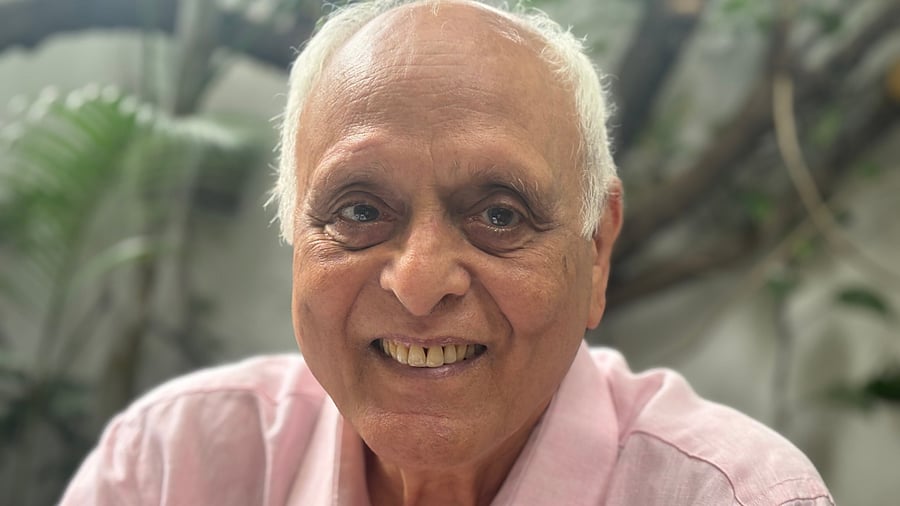
Credit: Special Arrangement
After a dozen successful shows in Bengaluru and Mumbai since it premiered in October 2019, the late Girish Karnad’s last play ‘Crossing to Talikota’ (‘Rakkasa Tangadi’ in Kannada) is being staged again in Bengaluru, proving its popularity and relevance.
Karnad handpicked acclaimed director Arjun Sajnani to direct the “difficult” play, by giving him the script, a challenge that the latter took up.
The play revolves around the fall of the Vijayanagara empire, whose capital city Hampi was left in ruins after the war at Talikota. The Sultans of Bijapur, Golconda, Bidar and Ahmednagar combined forces to challenge and fight the hegemony of Ramaraya, regent ruler of the Vijayanagara empire.
The play also explores caste, gender, greed, deceit and religious loyalties. It is the fourth Karnad play directed by Sajnani.
Excerpts from an interview with Sajnani.
You were fortunate to get ownership of the play. Was it also a huge responsibility?
It was a huge responsibility particularly since Karnad passed away in June 2019. He was not the kind of writer who interfered in the directorial process; he had said ‘the play is yours’, he gave carte blanche. Not many writers let go off their work. Also, it is my kind of show, it is a huge production and quite full of grandeur and spectacle. So yes, he knew I would do justice to it.
Some directors rejected Karnad’s offer; you took on the challenge.
I know Naseeruddin Shah had looked at it and declined. I don’t know who else. I think they thought it was challenging; some may not have liked the piece, it is a difficult piece. It does not develop as a story, it is more of a historical pageant of how these events came about.
As my actors and I worked with the play, it took on a life that I think would have made Karnad very happy. Our current production is our third and that is bringing about more changes; actors like to experiment, the script does grow on you and I dare say whatever someone else may have thought, I took it on as a great challenge and fortunately it worked out.
Did you adhere strictly to the play’s text?
As in any original work, there are many things that directors and actors find in workshops that either work or don’t work. After my first premiere performance, I got a lot of feedback from the audience that they didn’t quite get the beginning. I made some changes.
But we had to present the view that Karnad wanted to present — about the fall of Hampi. I consolidated three little scenes, made it into one, made it a narration, which incorporated everything that he wanted to say in those three scenes; it worked better. As director I’m careful about not only presenting the playwright’s views but also being loyal and true to the text.
How challenging was it to adapt on stage?
It is, what I consider, Operatic in scale. I watched a lot of Operas in New York, I am a great Opera buff, I’ve seen a fair amount on YouTube. I thought it was a good idea to use technology — the LED screens to make seamless, immediate changes to scenes. One scene didn’t end necessarily, it just segued into another. That way we were able to give the play a lovely form, linear or non-linear and visually it became a treat. My team did a great job.
One sees parallels in the narrative to current times.
Very easily, very obviously, with villains on both sides — Hindus and Muslims. What is good about it is, how Karnad tangentially demonstrated that the two cultures/religions had an amicable relationship.
This is a piece of playwriting based on history. So, he takes the characters and gives them their own motivation; yes, the political situation in this country and his approach to politics at that time by our hero certainly draws parallels to present day.
What interested Karnad was the use of authoritarianism, dictatorship, tyrannical kings and ruthless killings. At that time, we were going through certain phases in our country and all these had some kind of real relationships and resonance and reference to us.
The conflict was not based on religion; it was a geo-political affair much like Ukraine-Russia where you want to gobble up territory and assert yourself.
Next, a film on ‘Crossing to Talikota’?
Javed Siddique and I have the script ready. We are looking for a producer. Meanwhile, I am doing Chandrashekhara Kambara’s play ‘Jokumaraswamy’ in December.
(The play is being staged on Aug 9 and 10 at Prestige Srihari Khoday Centre for Performing Arts, Konanakunte)